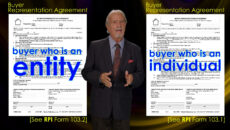Distressed homeowners have a variety of ways to deal with the financial plight of a negative equity position or a default on their mortgage. However, workout methods available to them inflict different results on the homeowner’s credit score. Some methods, such as refinancing a negative-equity, 125% loan-to-value (LTV) ratio mortgage, have a negligible effect. Others, such as a loan modification in which any late payment or penalty is added to the principal amount, may actually improve a borrower’s credit score.
However, in most instances, the homeowner’s workout actions have nothing but a negative impact on his credit score. The severity of the impact varies dramatically depending on the corrective remedy employed. After a short sale, a credit score can drop 120-130 points. If the troubled homeowner intentionally walks away from his mortgage despite his ability to pay, called a strategic default, his credit may suffer a 140-150 deduction. In the most extreme case, the credit score of a homeowner who applies for bankruptcy protection will take a massive pummeling of 355-365 points. Lenders really despise bankruptcies and severely punish those who seek court protection from excess debt.
Nationally, the average credit score is declining. A growing number of homeowners, even those who are prime, are taking steps to either stave off foreclosure through some form of modification, or by negotiating a discount for one of the few short sales that actually occurs.
first tuesday take: Conventional wisdom tells you that taking a substantial hit in your credit score is unredeemably devastating, no matter how temporary. But just how important is a person’s credit score following the credit crisis that has severely crippled the credit of the entire banking system? Remember, lenders voraciously pursue profit through whatever means are legally allowable, and lenders profit only by making loans.
Now pay attention: it is not in a lender’s financial interest to freeze homebuyers out of the market for too long a time, the penalty imposed for having a foreclosure on your name. Doing so would impinge on their ability to make money from homebuyers who have proper debt-to-income ratios, a down payment, and a history of paying back debts – except for that one corruptive adjustable rate mortgage they let go to foreclosure on a negative-equity home.
A note of importance: 90% of homeowners who file for bankruptcy (bankruptcy being the worst-case-scenario cited in this article) have access to some form of secured credit within 18 months of their filing, and 75% even have access to unsecured lines of credit. Additionally, to obtain an FHA-insured mortgage with only a 3.5% down payment, a homebuyer must wait on the sidelines only two short years before FHA will insure a new purchase-assist loan. Though the post-bankruptcy homebuyer won’t be eligible for the most advantageous interest rates that would be available to a prime borrower, the post-bankruptcy homebuyer is hardly prevented from obtaining credit for a purchase-assist loan any prime borrower with equal qualification could obtain.
For a more detailed analysis of the credit score myth, see our “Credit after the NOD: the lender’s motivation to re-lend” article.
Re: “Mortgage woes’ impact on credit scores,” from The San Francisco Chronicle.











